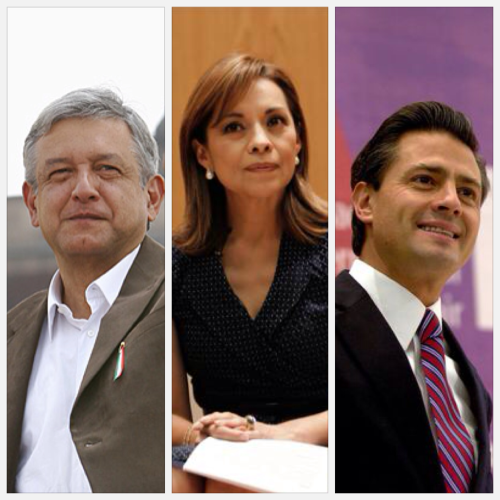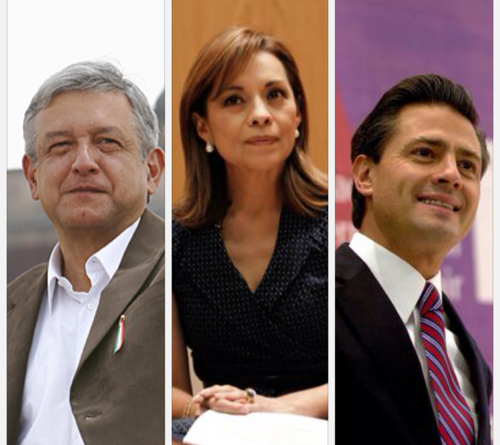The Future of Mexico’s Drug Strategy
Distracted by the admittedly discussion-worthy Cuba issue at the Sixth Summit of the Americas last month in Cartagena, the nations of the Western Hemisphere paid little mind to the prospect of reforming hemispheric drug policy. Latin American nations displayed unalloyed unity, indicating a deeply felt disdain for Washington’s normal agenda in the region. Several Latin American countries have demonstrated a desire to approach drug policy in a sharply different manner from the heavy-handed direction traditionally favored by U.S. policymakers. This prevailing tilt toward decriminalization became apparent as several Latin American countries proposed alternatives to the current strategy being used in the drug war.[1] Colombia, Guatemala, and Mexico have all proposed alternatives, each having recognized that militarized efforts against drug trafficking have proven ineffective.

This shift in ideology regarding the drug war is seismic, and may be a significant factor that influences coming elections throughout the hemisphere. For instance, with Mexico’s presidential elections approaching in July, it will be up to that nation’s voters to decide between three major candidates: Enrique Peña Nieto of the Institutional Revolutionary Party (PRI), Josefina Vázquez Mota of the National Action Party (PAN), and Andrés Manuel López Obrador of the Party of the Democratic Revolution (PRD). Each of these candidates proposes somewhat different solutions to the drug battle, and it falls to voters to evaluate these candidates on this crucial issue.
First, Josefina Vázquez Mota has campaigned under the mantle she will have to wear if she is to follow in the footsteps of fellow Panista Felipe Calderón. She is expected to continue using the nation’s military to combat cartel activity, a strategy employed in Mexico for the last few years. Alternatively, Enrique Peña Nieto of the PRI, which is favored to win the election, almost certainly plans to discontinue the use of the nation’s armed forces, in favor of strengthening the federal police force instead. Likewise, the PRD’s candidate, Andrés Manuel López Obrador, also plans to demilitarize the war, but differs from Peña Nieto in proposing the use of “alternate” methods. For all their fanfare, these approaches seem unlikely to produce a sensible outcome, and this article will critique the three security policies proposed by the candidates.
Since President Felipe Calderón assumed the Mexican presidency in 2006 by a narrow margin, he has proceeded to militarize anti-drug efforts in order to combat the profoundly sinister drug trade organizations. This ongoing “war” against the cartels, which has become notorious for its brutality, undermined the rule of law in Mexico and quickly dispensed with the observance of civil liberties. Consequently, Josefina Vázquez Mota has distanced herself from the current PAN administration. The military has committed many human rights abuses, such as torture, rape, and extrajudicial killings. The number of human rights complaints against the military at the National Human Rights Commission (CNDH) dramatically increased from 182 in 2006 to 1,230 in 2008, of which only 37 have resulted in a sentence.
Mexico’s military has acted with impunity, consistently violating the rule of law. To make matters worse, this heavy use of the military against cartels has allowed it to become engaged in Mexican politics, a very dangerous trend. Evidence of this shift can be found in the number of active-duty military commanders holding civilian leadership positions, which nearly doubled between 2000 and 2008 from 4,504 to 8,274. This expanded role of the military in Mexican politics, coupled with the increased politicization of the military itself, has disgraced the Mexican state’s “war” efforts and left about 50,000 dead in the wake of rampant violence. Although the use of military force continues to generate devastating negative effects, the PAN’s candidate, Ms. Vázquez Mota, has emphasized the desire to not stray from, but rather revitalize, Calderón’s strategy of militarization and collaboration with deployed U.S. security forces.
While Calderón’s policy has been justly criticized because it appears to lack an effective control remedy, Josefina Vázquez Mota and the PAN have attempted to bypass such criticisms by focusing on the victims of the drug war. This strategy may simply be a campaign ploy to negate some of the popularity of the PRI candidate, and it may suffer the same negative consequences as the current military-only approach. Even though Josefina Vázquez Mota plans to supplement Calderón’s militarization strategy with compassionate humanism, the other two candidates are rejecting the existing malfunctioning status quo, which is widely deemed a failure.
Exemplifying the critique of this misfiring strategy, Enrique Peña Nieto’s proposal patently refrains from using the military to combat the drug trade organizations, and he has made clear his intention to return the war on drugs to the usual cockpit presided over by the police force. According to Reuters correspondents Anahi Rama and Dave Graham, the PRI’s candidate is planning to bolster the federal police with 40,000 former military men in order to support the local police agents. This strategy has the capacity to produce one of two outcomes: with a decrease in militarization, organized crime may find one less barrier in the fight over territory; or, it is possible that violence may abate to the levels seen before the Calderón administration. However, it is most likely that Enrique Peña Nieto’s tactics would fail in combating the drug trade, as past use of the police has failed.
Ironically, Enrique Peña Nieto’s plans may actually not mark a noteworthy departure from the current administration’s efforts to curb the power and influence of drug commercialization. Although individual Mexicans may benefit from the reduction of violence, a strengthened police force may allow drug traffickers an easier opportunity to seize control of local governments, which have proven more susceptible to influence from drug cartels than the national government, as demonstrated by Nick Miroff and William Booth in their Washington Post article, “México’s 2012 Vote is Vulnerable to Narco Threat.” The pressing hope of drug cartels has been apparent in local elections and in the actions of local police forces that have been implicated in corruption, coercion, and extrajudicial violence. Worse, because of intense fragmentation and divisions exacerbated by drug activity; the federal police force will likely mimic its local counterparts, and it remains to be seen how this police force would differ from the ineffective federal security force of the past.

The AFI, México’s previously established federal security force, was disbanded in 2009, its reputation destroyed and one in every five of its personnel charged with corruption.[2] The lack of adequate resources, which drove corruption, also generated a predictably feeble institutional work ethic. Most notably, members of the force were paid only about $800 USD a month.[3] Faced with a crippling lack of economic opportunity, many AFI agents turned to corrupt dealings to provide for their dependents. Thus, unless Enrique Peña Nieto dramatically increases the funding of security forces, this time around is likely to be no different from the last.
Like Peña Nieto, the PRD candidate, Andrés Manuel López Obrador, plans to pull the military off the streets of Mexico. The leftist candidate, however, is also considering drug decriminalization, the use of targeted health programs, and the expansion of government jobs programs as a means of diminishing demand for the drug cartels’ services.[4] López Obrador’s strategy of job creation represents a move to make available greater employment opportunities in Mexico, aside from those offered by the high-paying cartels. López Obrador also hopes that health programs, like those aimed at drug rehabilitation, would reduce the internal demand for drugs, as well as the profits of the cartels. The PRD candidate’s alternate strategies have potential, but could fall flat, or may even strengthen the drug trade.
Andrés Manuel López Obrador’s proposal for creating jobs and increasing minimum wages may not be a sufficient incentive to halt Mexicans from turning to drug cartels as valuable sources of income. According to Counterpunch journalist Paul Imison, this attraction lies in the fact that the Mexican drug trade is estimated to be worth $30–50 billion USD annually.[5] Additionally, the policy of decriminalization (if it does not involve the United States), while reflecting the desire of a number of Latin American countries to try other methods of combating organized crime, does not address the ultimate problem of heightened U.S. demand for drugs. As a result, drug cartels would still acquire profits and infiltrate public authorities that would be impacted by the outcome of decriminalization.
However, as was evident at the Sixth Summit of the Americas, many countries are beginning to realize that the heavy-handed, militarized approach to the problems created by excessive violence in the war against drugs is in need of reassessment, and that alternate methods to this approach should reflect changing norms. For the first time, leaders like Presidents Juan Manuel Santos of Colombia, Otto Perez Molina of Guatemala, and Laura Chinchilla of Costa Rica are boldly discussing policy alternatives, while such countries as Argentina, Brazil, Colombia, Ecuador, Mexico and Uruguay have agreed not to discriminate against recreational marijuana.[6] In contrast, the U.S. is averse to these changing attitudes, and therefore this move toward alternate approaches will find resistance from obstinate U.S. policymakers.
The three candidates competing for the Mexican presidency offer interesting solutions to the increasing concerns over organized crime and the violence it propagates; however, all these strategies seem unlikely to succeed. The policy that Josefina Vázquez Mota has proudly campaigned on, which the man she is hoping to replace is currently relying upon, has yet to experience success. Enrique Peña Nieto’s suggested policy has had a history of failure, and, while Andrés Manuel López Obrador’s may address the issue of violence and is in sync with the desires of other Latin American countries, it would no doubt come under fire from the U.S. Still, it is absolutely necessary that Washington consider innovative proposals, like those of López Obrador, which are coming from the Latin American countries most affected by the drug war. The parochial and half-hearted nature of U.S. drug policy has too long fostered instability in many Latin American countries. Non-military approaches to the drug problem should not be automatically excluded, even as a product of Mexico’s upcoming elections.
To review sources, please click here.
Please accept this article as a free contribution from COHA, but if re-posting, please afford authorial and institutional attribution.
Exclusive rights can be negotiated.


